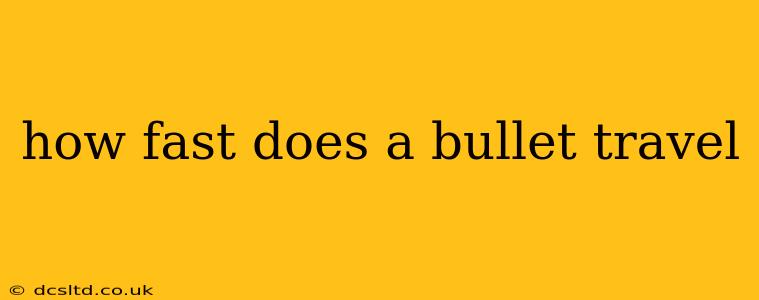How Fast Does a Bullet Travel? A Deep Dive into Projectile Velocity
The speed of a bullet isn't a single number; it varies dramatically depending on several factors. Understanding these factors is key to grasping the true answer to "How fast does a bullet travel?".
This comprehensive guide will explore the factors influencing bullet velocity, delve into typical speeds for various calibers, and address some frequently asked questions.
What Factors Determine Bullet Speed?
Several key factors influence how fast a bullet travels:
-
Caliber: Larger calibers generally propel heavier bullets at lower velocities than smaller calibers with lighter bullets. This is because the same amount of propellant needs to move a heavier projectile.
-
Cartridge Type: Different cartridges (the casing containing the bullet, propellant, and primer) are designed for different purposes, resulting in varying velocities. A high-powered hunting round will travel much faster than a low-velocity round designed for target shooting.
-
Barrel Length: A longer barrel allows more time for the propellant to burn and accelerate the bullet, leading to higher velocities.
-
Propellant Type and Quantity: The type and amount of gunpowder used significantly impact bullet speed. Faster-burning propellants generally produce higher initial velocities.
-
Bullet Weight: Heavier bullets, even with the same propellant, will generally have lower velocities than lighter bullets. This is due to inertia – heavier objects require more force to accelerate to the same speed.
-
Environmental Conditions: Temperature, humidity, and altitude can subtly affect bullet velocity. Higher altitudes generally lead to slightly lower speeds due to thinner air.
What is the Average Speed of a Bullet?
There's no single "average" speed. However, we can provide some ranges for common bullet types:
-
Handguns: Typical velocities range from 700 to 1,500 feet per second (fps), or 210 to 460 meters per second (m/s).
-
Rifles: Velocities are significantly higher, often ranging from 2,000 to 3,000 fps (610 to 910 m/s) or even more for some high-powered rounds.
-
Subsonic Ammunition: Designed specifically to travel slower than the speed of sound (approximately 1125 fps or 343 m/s), these rounds are used for specialized purposes like suppressed firearms.
How Far Does a Bullet Travel?
The distance a bullet travels depends on many factors in addition to its initial velocity: bullet design (ballistic coefficient), environmental conditions (wind, humidity), and the angle of fire. Bullets can travel several hundred yards or even more than a mile, depending on these factors.
What is the Fastest Bullet Ever Made?
Pinpointing the absolute "fastest" bullet is difficult due to proprietary information and the constant evolution of ammunition technology. However, some experimental rounds have achieved remarkably high velocities, significantly exceeding 4,000 fps. These are typically not used in standard firearms and are often reserved for specialized applications.
Are there different types of bullets with different speeds?
Yes, absolutely. The vast array of calibers and cartridges available for firearms cater to various needs, resulting in significant differences in bullet speed. High-velocity rounds are favored for hunting and long-range shooting, while lower-velocity rounds are better suited for target practice or self-defense applications where overpenetration is a concern. Even within the same caliber, different bullet weights and designs will affect the final velocity.
What are the safety precautions when handling bullets and firearms?
Safe handling of firearms and ammunition is paramount. Always treat every firearm as if it were loaded. Store ammunition securely and separately from firearms. Never point a firearm at anything you don't intend to shoot. Seek proper training and education before handling any firearm. Consult with firearms experts or relevant authorities for detailed safety guidelines specific to your region and the type of firearm you possess.
This information is for educational purposes only. Always consult with qualified professionals for advice and training related to firearms and ammunition. Improper handling of firearms can be extremely dangerous and potentially lethal.
